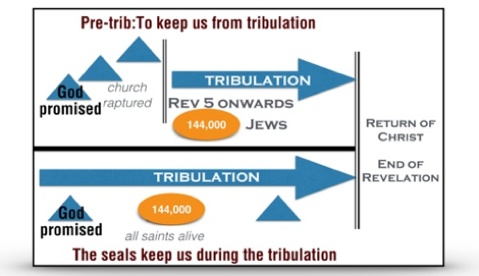
Does Revelation Support a
Pre-Tribulation Rapture?
Revelation 4:1
Problem 1 (Rev 3:10) | Problem 2 (Rev 4:1) | Problem 3 (Rev 4:4)
Revelation 1:4-8 | Revelation 1:5-6 God's Purpose | Revelation 1:5-6 God's Plan
Does Revelation Support a Pre-Tribulation Rapture? | Revelation 8-11
Paul J. Bucknell
The issue with those who love the scriptures is not if there is a rapture but when it will take place. Others accept either a mid-tribulation, post-tribulation rapture or others prefer to simply identify it as the time of Jesus return and not relate it to the tribulation. Our issue here is not to debate the timing but to examine the support the pre-tribulationists find from Revelation for their viewpoint. In doing so, they reinterpret key Revelation teaching points to fit their prophetic scheme.
What follows, then, is an examination of their three most definitive arguments to insert the rapture before the tribulation period from the Book of Revelation. Study questions are also provided. The second problem is identified below. (Problem 1)
2. Invitation (Rev 4:1)
4:1 “After these things I looked, and behold, a door standing open in heaven, and the first voice which I had heard, like the sound of a trumpet speaking with me, said, “Come up here, and I will show you what must take place after these things.’” (NASB)
The invitation refers to the rapture of the church to heaven.
The second drama opens here by John being whisked in the spirit to heaven (4:1). Before showing God’s grand redemptive program on earth by opening the scroll, John is shown grandeur scenes from Revelation–of worship, adoration and glory of Jesus Christ the Lamb/Lion.
Many pre-tribulationists use this verse 4:1 to indicate when the rapture of the church occurs–the timing. For them, to be consistent with the above point, the rapture must occur before the tribulation which, in the Book of Revelation, begins immediately after this scene in chapter 6. To my surprise they assert that this invitation to John in 4:1 refers to the rapture of the church into heaven rather than to John. I have a hard time understanding why someone would use this ‘forced’ interpretation, but let’s look at it more closely.
How is it that such a personal invitation to John–clearly indicated by the number of “I”s in this verse (3 times)–to be interpreted to be an invitation to the church? John, not the church was addressed (nor the Philadelphian local assembly). The very context demands a temporary sight of heaven–John was not expected to remain there in heaven forever for he was in the spirit (not Spirit): “Immediately I was in the Spirit” (4:2). Nor do we see any clear indication that a rapture, as understood from 1 Thessalonians 4 is alluded to.
Once the conclusion that this invitation refers to the rapture–instead of John–is accepted, then the whole interpretation of Revelation is twisted to fit this scheme. So the 144,000 must be the saved Jews who are evangelizing the world. No one has problems with this possibly happening but to force the context of a churchless world is irresponsible. Where does it say this in Revelation? If this is the book to clarify the end times, then why is it so secretive?

Perhaps the most conclusive reason that we should reject this interpretation is the inconsistent way they substitute the church for John. For example, why is the church not substituted for John in Rev 1:9-10?
I, John, your brother and fellow partaker in the tribulation and kingdom and perseverance which are in Jesus, was on the island called Patmos, because of the word of God and the testimony of Jesus. I was in the Spirit on the Lord’s day, and I heard behind me a loud voice like the sound of a trumpet. (Rev 1:9-10)
Clearly, they would not switch John for the church in these verses or other verses throughout Revelation. For the pre-tribulationists to make this switch (John represents the church) to accommodate their view is unacceptable and blatantly wrong. Pre-tribulationists can believe in their pre-tribulation rapture, but they should not consider Revelation 4:1 to provide any support for it.
Does Revelation Support the Pre-tribulation Rapture?
Yes, this John’s be taken to heaven in the spirit happened before chapter 6 and the tribulation trials would soon be listed, but let us not forget the major teaching: All of the seemingly uncontrollable evil events worming their way around the globe are to be viewed from heaven’s perspective rather than from the earth. The saint is to have a steady view of God’s glorious throne even in the midst of some of the most heinous acts on earth.
Discussion Questions on 4:1
-
Who is called to be whisked up in the spirit to heaven? How do you know?
-
Is there any indication that John is a symbol or representative of the whole church? If so, please share.
-
Ten times “I” is used in chapter 6 of John. Please affirm how “I” should refer to the church rather than John–so to be consistent with the pre-tribulatonal interpretation where the church is taken to heaven.
Next => 3. Identification (Rev 4:4)
 BFF Bible articles teach with a clear purpose of training us in righteous so that we might be those men of God ready for the tasks God has set before us, including training others to follow Jesus (2 Timothy 3:16-17).
BFF Bible articles teach with a clear purpose of training us in righteous so that we might be those men of God ready for the tasks God has set before us, including training others to follow Jesus (2 Timothy 3:16-17).
Click on and see many more quality biblical materials are on the BFF Biblical Digital Libraries (OT & NT) today! Order Online
info@foundationsforfreedom.net
Scriptures typically quoted from the New American Standard Bible unless noted:
(C) Copyright The Lockman Foundation 1988










